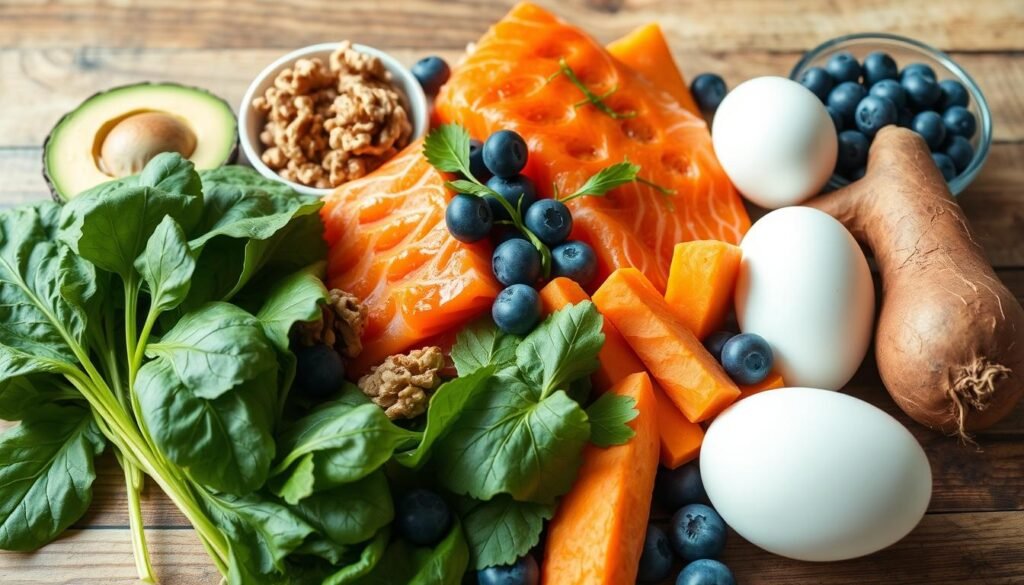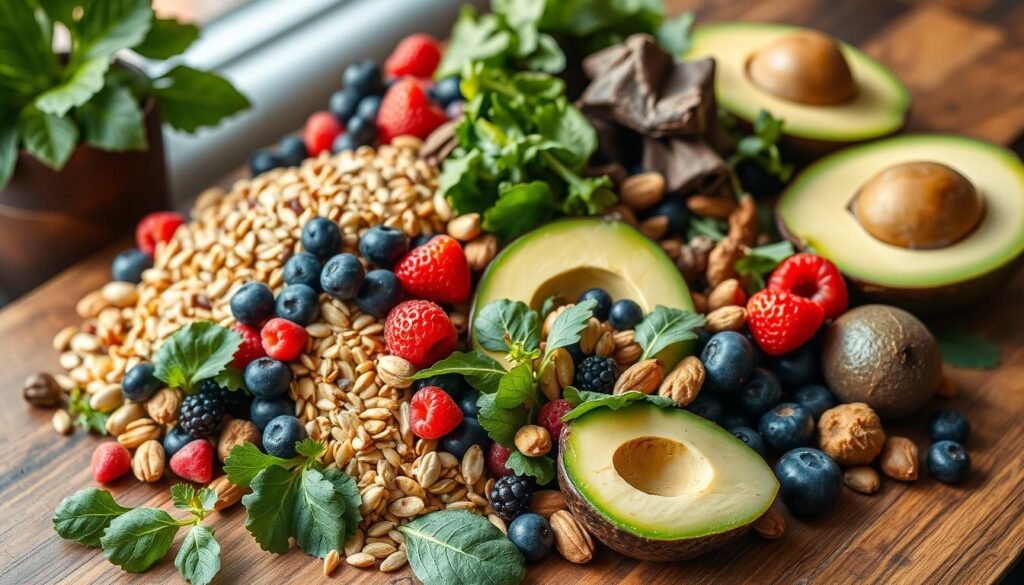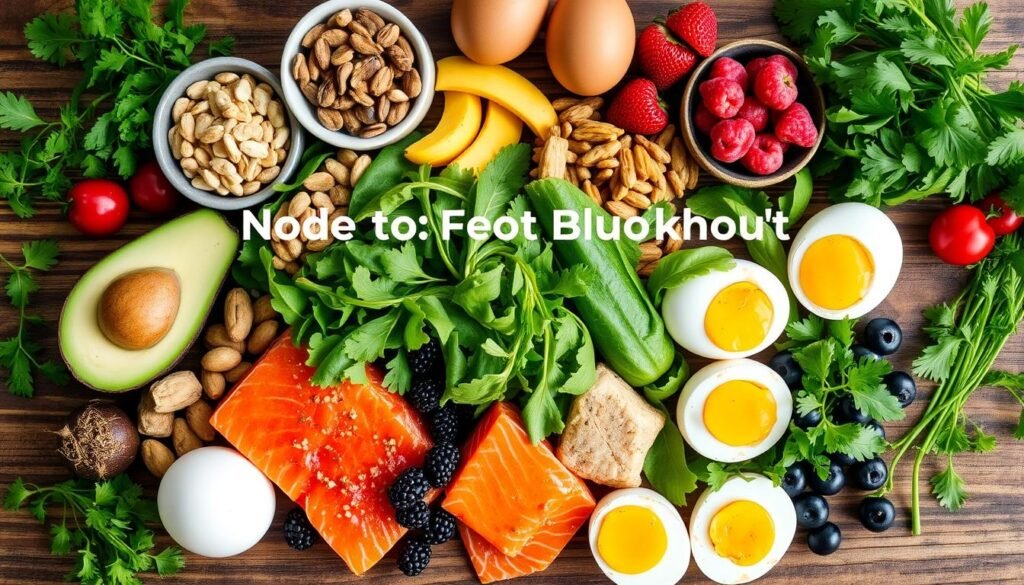Did you know losing up to 100 hairs a day is normal? However, when hair thinning becomes excessive, it might point to issues like poor nutrition. There’s a clear link between your diet and hair health. Studies show that eating well can reduce hair loss and encourage healthy growth. Learning what to eat to prevent hair loss is key for anyone worried about their hair.
Picking the right foods for healthy hair greatly impacts its condition. Adding certain nutrients to your hair growth diet boosts hair follicles and improves scalp health. This piece will discuss how nutrition plays a vital role in keeping hair full and strong, focusing on the best foods to fight hair loss.
Key Takeaways
- Hair loss can be influenced by various factors, with diet being a significant contributor.
- Integrating nutrient-rich foods into daily meals supports healthy hair growth.
- Eating enough protein, vitamins, and minerals is crucial for preventing hair loss.
- Anti-inflammatory diets, like the Mediterranean diet, promote overall hair health.
- Specific foods such as eggs, fatty fish, and leafy greens are excellent choices for strong hair.
Introduction to Hair Loss and Nutrition
Hair loss is common and can come from many sources, like genes, hormonal changes, and not getting enough nutrients. Knowing how important nutrition is for keeping hair healthy is crucial. Eating the right foods can really make a difference in growing hair and stopping it from falling out.
Studies show that hair grows about 0.35 mm per day. People lose about 100 hairs a day, especially when they wash or comb their hair. A lack of vitamin D is often linked to losing hair. In fact, 80% of people looked at had too little of it. Not having enough iron is the most common nutrition problem worldwide and is linked to a type of hair loss called telogen effluvium.
Lacking important nutrients for hair health like biotin, zinc, and vitamins B12 and folate can lead to hair loss. Eating well can help prevent these shortages. Our bodies need good food to keep hair cells growing. These cells grow fast and are key for healthy hair.
If you’re losing hair, try to eat a variety of foods to get the vitamins and minerals you need. Learning to eat well can help stop hair loss problems. This can lead to stronger, healthier hair.
Understanding the Role of Nutrition in Hair Health
Nutrition is key for keeping hair healthy, affecting how it grows and lasts. Hair needs protein to be strong. A good hair loss diet should have enough protein, vitamins, and minerals to help hair follicles.
Water matters a lot for hair, making up about 25% of it. Staying hydrated keeps the scalp healthy and fights dandruff. Drinking at least two litres of water every day is important for both hair and overall body health. There are also stages in the hair life cycle, like the anagen and catagen phases. Good nutrition helps hair through all these phases.
Poor nutrition can cause hair problems, like more hair falling out. Not having enough iron, zinc, and biotin is bad for hair health. Low iron can make you tired and look pale, pushing you to eat iron-rich foods like red meat and spinach. Zinc helps with hair growth, and biotin (or vitamin B7) boosts keratin production. It’s key to eat a diet for thick hair, avoiding too much sugar and fats to keep hair in top shape.
There’s a deep link between what you eat and the health of your hair. Eating the best foods for strong hair and a varied diet full of good nutrients can fight hair loss and encourage hair to grow back.
Essential Nutrients for Hair Growth
Good hair health is more than skin deep. Eating right plays a key part in having healthy, thick hair. Foods loaded with specific nutrients for hair health are vital. They help prevent hair loss and foster new growth.
Proteins and Amino Acids
Hair mainly consists of keratin, a type of protein. This makes eating protein-rich foods very important. Not eating enough protein can cause your hair to thin or fall out. Chicken, fish, beans, and nuts are great for your hair. They support its structure and keep it healthy.
Vitamins and Minerals
Vitamins like B12 and Vitamin D are key for vitamins for hair growth. B12 aids in making red blood cells. These cells transport oxygen to your scalp, boosting hair growth. Vitamin D helps produce new hair follicles, which is crucial for a healthy scalp.
Iron and zinc are important minerals too. Iron is often lacking, especially in women. Not having enough can lead to weak hair and more falling out. Zinc helps make cells and supports hair’s protein structure. Not getting enough zinc can cause your hair to become brittle and fall out.
| Nutrient | Role in Hair Health | Sources |
|---|---|---|
| Protein | Builds hair structure | Chicken, eggs, fish, legumes |
| B12 | Supports red blood cell formation | Meat, dairy, fortified cereals |
| Vitamin D | Encourages new hair follicle formation | Fatty fish, egg yolks, mushrooms |
| Iron | Prevents hair thinning and loss | Red meat, spinach, lentils |
| Zinc | Supports protein structure and cell reproduction | Meat, shellfish, nuts, seeds |
What to Eat to Prevent Hair Loss
Eating a balanced diet is key to keeping your hair healthy and preventing loss. Certain foods give important nutrients that help hair grow back. To stop hair loss, add foods full of nutrients to your diet and avoid missing key vitamins.
Best Dietary Choices for Hair Regrowth
Some foods are great for hair growth because of their nutrients:
- Eggs: They’re loaded with biotin, which is a must for healthy hair. Without enough biotin, you might lose hair.
- Fatty Fish: Salmon and sardines are packed with omega-3s. These fats keep your scalp healthy.
- Spinach: It has iron, folate, and vitamins A and C. These can all help lower the chance of losing hair.
- Bell Peppers: They have more vitamin C than oranges. This helps your body use iron better to keep hair strong.
- Nuts and Seeds: Brazil nuts and pumpkin seeds have selenium, magnesium, and zinc. These minerals are important for hair health.
Avoiding Nutritional Deficiencies
It’s important to watch your diet to avoid losing hair. Lacking certain vitamins and minerals can really affect your hair:
- Zinc: Oysters have lots of zinc, which is vital for hair growth. Not getting enough zinc can cause hair loss.
- Iron: Spinach and lentils are good sources of iron. This can help prevent your hair from thinning.
- Vitamin D: Eating rainbow trout gives you a lot of vitamin D. Low levels of vitamin D are linked to thinning hair.
- Biotin: Whole grains, like oats and barley, have biotin. Not getting enough biotin may lead to hair loss.

Add these hair-helping foods to your meals to grow stronger, healthier hair. Eating a variety of nutrient-rich foods is an easy and effective way to keep your hair vibrant and avoid missing important nutrients.
Top Foods to Combat Hair Loss
Some foods are especially good at fighting hair loss. They can make your hair stronger and healthier. To prevent hair loss, it’s a good idea to eat foods full of nutrients.
Eggs for Protein and Biotin
Eggs are great because they have a lot of protein and biotin. These are key for strong hair. If you don’t get enough protein, you might lose hair. Eating eggs often can give your hair what it needs to stay healthy.
Berries for Antioxidants
Berries, like strawberries, are packed with antioxidants and vitamin C. A single cup of strawberries can meet 113% of your daily vitamin C needs. This nutrient is important for making collagen. It helps make your hair strong and fights off damage, which is why berries help prevent hair loss.
Fatty Fish for Omega-3 Fatty Acids
Fatty fish, such as salmon, have lots of omega-3 fatty acids. These fats are great for your hair, helping with scalp blood flow. Adding fatty fish to your meals can keep your hair thick and strong. It’s a key part of eating right for your hair.
Spinach for Iron and Folate
Spinach is also amazing for your hair. It gives you iron and folate, boosting oxygen to your hair roots. Just one cup of spinach has about 20% of the vitamin A you need each day. For stopping hair loss, leafy greens like spinach are crucial.
| Food | Key Nutrients | Benefits |
|---|---|---|
| Eggs | Protein, Biotin | Supports strong hair growth and prevents loss |
| Berries | Vitamin C, Antioxidants | Strengthens hair and boosts collagen production |
| Fatty Fish | Omega-3 Fatty Acids | Promotes scalp health and hair thickness |
| Spinach | Iron, Folate | Enhances circulation to hair follicles |
Eating a diet full of these top foods for strong hair can really help fight hair loss. For more tips and food choices to control hair fall, you can check this resource.
Role of Antioxidants in Hair Health
Antioxidants protect hair follicles from damage caused by free radicals. These radicals come from the environment, bad diet, and lifestyle. Eating foods high in antioxidants is key for healthy, strong, and vibrant hair.
How Antioxidants Protect Hair Follicles
Antioxidants fight off free radicals that harm cells. This includes cells that make hair grow. They prevent health issues and improve hair’s elasticity to reduce breakage. Not having enough antioxidants can cause brittle hair and slow growth. Adding more antioxidants to your diet makes hair thicker and better quality.
Fruits and Vegetables High in Antioxidants
Many fruits and vegetables are full of antioxidants, important for healthy hair. Great choices include:
- Berries: Blueberries, strawberries, and acai berries have lots of vitamin C and antioxidants.
- Leafy Greens: Spinach and kale give you vitamins A and K, good for hair.
- Nuts and Seeds: Almonds, walnuts, and sunflower seeds offer vitamin E and fats for nourishing hair.
- Citrus Fruits: Oranges and lemons provide vitamin C to help with collagen production.
- Carrots: Rich in beta-carotene, they keep the scalp healthy.
Eating brightly colored fruits and vegetables helps hair and overall health. More of these foods means a better diet, preventing hair loss and boosting growth.

Vitamins and Their Impact on Hair Growth
Vitamins are key in promoting hair growth and avoiding hair loss. The right vitamins ensure hair follicles get needed nutrients. B vitamins mixed with Vitamin D are very important for this.
The Importance of Vitamin B Complex
B vitamins are vital for hair health. B6, B12, and folic acid make red blood cells. These cells bring oxygen to your hair roots. Not having enough Vitamin B12, often seen in older adults, can make hair loss worse. Biotin, or Vitamin B7, is praised for its benefits in hair support. Adults should take 30 mcg daily. Also, niacin (Vitamin B3) boosts blood flow to the scalp. This can lessen hair loss and thinning.
Vitamin D and Hair Follicle Health
Vitamin D is crucial for hair roots. Around 40% of American adults lack enough Vitamin D, harming hair growth. Enough Vitamin D can activate hair follicles, encouraging new hair. Eating foods rich in Vitamin D or taking supplements helps keep levels right. This may help reduce hair loss.
Minerals Essential for Strong Hair
The health of hair relies on essential minerals. Minerals like zinc and iron are key for strong, healthy hair. They help your hair grow well and stay healthy.
Iron and Zinc: Key Players in Hair Growth
Iron carries oxygen to your hair follicles. Without enough iron, hair may thin or fall out, especially in women. Getting enough iron makes hair stronger and helps it grow. Zinc is also important for healthy hair. It supports hair growth and keeps hair follicles strong. Without enough zinc, people can lose their hair. So, iron and zinc are crucial for keeping hair strong.
The Role of Magnesium in Hair Health
Magnesium is important but often overlooked. It helps make proteins and gives energy for making hair. Not having enough magnesium can slow down hair growth. This is because it’s needed for making keratin, a hair protein. Eating foods rich in magnesium can boost hair health. This helps prevent hair loss.
| Mineral | Benefits for Hair | Sources |
|---|---|---|
| Iron | Transports oxygen; prevents hair thinning | Red meat, beans, spinach |
| Zinc | Supports growth cycle; maintains follicles | Oysters, nuts, seeds |
| Magnesium | Promotes protein synthesis; aids growth | Green leafy vegetables, whole grains, nuts |
In summary, iron, zinc, and magnesium are vital for strong hair. Eating a diet rich in these minerals helps make your hair strong and healthy.
Healthy Fats and Their Benefits for Hair
Eating healthy fats can greatly improve your hair health. Including omega-3 fats in your diet is key. They nourish hair follicles and keep the scalp healthy.
Foods like salmon, mackerel, and sardines are full of omega-3 fatty acids. These foods boost hair growth and make it shinier.
Healthy fats make your hair stronger and less likely to break. Eating fatty fish provides plenty of protein for hair strength and growth. Flaxseeds and walnuts are also great omega-3 sources.
These fats help keep your scalp and hair hydrated. Omega-3s prevent dry and brittle hair. A diet with these fats leads to vibrant, healthy hair.
For more tips on how food affects hair, visit this helpful resource.
Advising clients to eat healthier fats can boost their hair’s health. Eating these fats regularly makes hair shinier and reduces hair loss risks.
Creating a Healthy Diet for Thick Hair
A well-balanced diet for thick hair is key to getting healthy, full hair. Eating a mix of foods gives you the necessary nutrients for hair to grow well. It’s important to eat from different food groups. This way, you get many vitamins and minerals that keep hair strong.
Incorporating Variety in Your Meals
Adding different foods to your diet is important for your hair. Various nutrients can strengthen the roots and make the scalp healthier. Here’s what you should include:
- Protein: It’s crucial for hair structure; you can get it from eggs and beans.
- Iron: Green veggies and whole grains carry iron, improving nutrient flow to the roots.
- Vitamins: Vitamin A in carrots and Vitamin C in citrus fruits are great for keeping hair moisturized and improving scalp blood flow.
- Healthy Fats: Nuts and avocados are packed with Omega-3s, which help in making hair thick and hydrated.
Sample Meal Ideas for Hair Health
Here are some easy meal ideas for better hair:
| Meal | Description |
|---|---|
| Breakfast | Scrambled eggs with spinach and whole-grain toast offer protein and iron. |
| Lunch | A salad with mixed greens, nuts, berries, and seeds gives you antioxidants and Omega-3s. |
| Dinner | Grilled salmon with veggies is full of healthy fats and essential nutrients for hair. |

Conclusion
Nutrition is key in keeping hair healthy and stopping hair loss. Knowing what to eat helps people make their hair grow healthier. Foods high in antioxidants like oranges, spinach, and fatty fish help a lot. They make hair grow and keep the scalp healthy.
Eating too little protein can cause hair problems. It can make hair stop growing and enter a rest phase. It’s important to eat protein-rich foods like eggs, dairy, and lentils. Also, eating foods with iron helps fight hair loss. This makes hair stronger and healthier.
Dealing with hair loss gets easier with the right diet and treatments like minoxidil. Being consistent with food choices and treatments improves hair. Over time, you’ll see your hair get thicker and stronger. For more tips on keeping your hair healthy, check out what to eat to prevent hair loss.